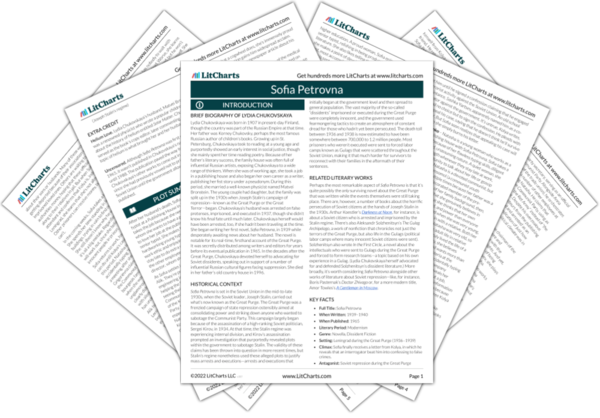Uncertainty and Disbelief
Sofia Petrovna illustrates the intense emotional torture that often arises when people face chaos and uncertainty. The novel is set during a period in the 1930s known as the Great Purge, in which the Soviet Union imprisoned and murdered thousands of innocent citizens accused of undermining the communist cause. Sofia Petrovna’s son, Kolya, is one of these citizens, but Sofia doesn’t know anything about his case. She doesn’t know why he was…
read analysis of Uncertainty and DisbeliefPatriotism and Fanaticism
In one way or another, all of the characters in Sofia Petrovna get swept up in a fanatical, overzealous kind of patriotism in support of the Soviet Union. Their intense commitment to the Communist Party is largely a function of the Soviet Union’s political climate in the mid-1930s—a time when the Soviet leader, Joseph Stalin, carried out a frenzied campaign of state repression after the assassination of a high-ranking Soviet politician. Because the government…
read analysis of Patriotism and FanaticismPride, Status, and Moral Superiority
Although Sofia Petrovna is primarily about the horror of losing a loved because of a corrupt and tyrannical government, it’s also a novel about what happens to vanity and social status in the face of hardship. Before her son is arrested, Sofia Petrovna takes great pleasure in her role as a senior typist and the small amount of authority that comes along with the position. She condescendingly tells one of her housemates that it’s a…
read analysis of Pride, Status, and Moral Superiority
Loyalty, Political Allegiance, and Truth
Sofia Petrovna questions the limits of political allegiance, exploring how long people will remain loyal to repressive governments. As someone who genuinely believes in the good intentions of the Communist Party under Joseph Stalin, Sofia Petrovna is slow to question the government’s actions—even when her own son Kolya is arrested and imprisoned without just cause. For most of the novel, she insists that Kolya’s arrest was nothing more than a mistake. Despite the fact…
read analysis of Loyalty, Political Allegiance, and Truth






